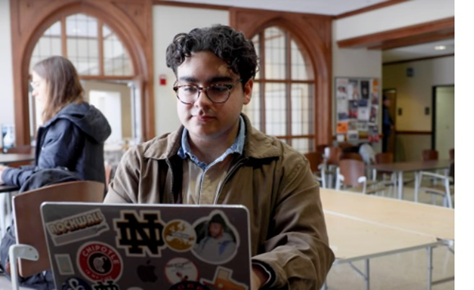
What do I believe is my professional vocation? Practicing medicine. What field is increasingly important in a digital age? Computer Science. Therefore, what is the most underrated, yet perfect major for me? Science-Computing (not to be confused with Computer Science). As I have changed my major more than five times, Science-Computing grants me the flexibility to take classes in preparation for medical school in the College of Science; however, I can also take any Computer Science course in the College of Engineering. The flexibility of the Science-Computing major has allowed me to study my interests outside of science and engineering as well, with minors in European Studies, Compassionate Care in Medicine, and Poverty Studies.
The Science-Computing collegiate sequence major is an individualized course of study which incorporates courses from the four basic areas of science, along with a sequence of computing courses. Through my College of Engineering coursework, I have gained a working knowledge of various computer languages and analytical skills. Additionally, through my College of Science education, I plan to matriculate to medical school with the required prerequisites, with a concentration in neuroscience coursework. Housed in the College of Science, the Science-Computing major is very underground, with only thirteen students across the University. Even with a small population of students and graduates, Science-Computing majors can do it all, from medical school to consulting.
This semester, I am enrolled in a course titled “Ethical and Professional Issues in Computer Science,” which aims to develop a solid foundation for reasoning about ethical, professional, and social issues that arise in the context of computer science and engineering. With an emphasis on identifying appropriate legal and moral contexts for salient issues in Computer Science, through the class, we apply different frameworks to computer technology, the nature of contemporary tech work, social media, artificial intelligence, and information security and privacy. Even though most of my Computer Science coursework is in programing, as Notre Dame seeks to be a force for good in the world, this class affords us the opportunity to broaden our Computer Science backgrounds, turning our heads from blocks of code to society, looking at the intersection of technology and our community.
While I prepare to matriculate to medical school, I can leverage my Science-Computing background as it has prepared me to think analytically outside the natural sciences. In the context of a technology-driven society, Science-Computing’s flexibility allows me to cater to my interests in Computer Science, while focusing on my medical school prerequisites—it is truly the best of both worlds.